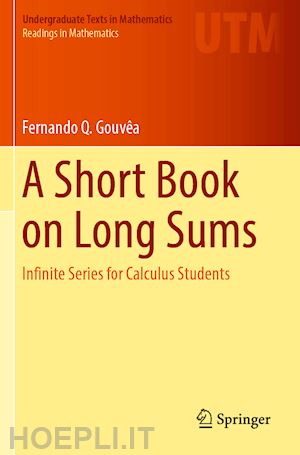
Questo prodotto usufruisce delle SPEDIZIONI GRATIS
selezionando l'opzione Corriere Veloce in fase di ordine.
Pagabile anche con Carta della cultura giovani e del merito, 18App Bonus Cultura e Carta del Docente
This concise textbook introduces calculus students to power series through an informal and captivating narrative that avoids formal proofs but emphasizes understanding the fundamental ideas. Power series—and infinite series in general—are a fundamental tool of pure and applied mathematics. The problems focus on ideas, applications, and creative thinking instead of being repetitive and procedural.
Calculus is about functions, so the book turns on two fundamental ideas: using polynomials to approximate a function and representing a function in terms of simpler functions. The derivative is reinterpreted in terms of linear approximations, which then leads to Taylor polynomials and the question of convergence. Enough of the theory of convergence is developed to allow a more complete understanding of power series and their applications. A final chapter looks at the distant horizon and discusses other kinds of series representations. SageMath, a free open-source mathematics software system, is used throughout to do computations, provide examples, and create many graphs. While most problems do not require SageMath, students are encouraged to use it where appropriate. An instructor’s guide with solutions to all the problems is available.The book is intended as a supplementary textbook for calculus courses; lecturers and instructors will find innovative and engaging ways to teach this topic. The informal and conversational tone make the book useful to any student seeking to understand this essential aspect of analysis.
- To the reader.- Getting close with lines.- Getting closer with polynomials.- Going all the way: Convergence.- Power series.- Distant mountains.- Appendix A: SageMath: A (very) short introduction.- Appendix B: Why I do it this way.- Bibliography.
Fernando Q. Gouvêa is a number theorist and historian of mathematics. In number theory, he has been interested in the connection between p-adic modular forms and deformations of Galois representations. As a historian, his main focus is on the early history of algebraic number theory, but he has also written on other historical topics. He enjoys books and has written many book reviews for a wide range of publications. For many years, he served as an editor of MAA Focus and MAA Reviews. His current project is a forthcoming book on the history of p-adic numbers and p-adic analysis in the first decades of the twentieth century. Gouvêa’s other books include Arithmetic of p-adic Modular Forms, A Guide to Groups, Rings, and Fields, and (with William P. Berlinghoff) Math through the Ages: A Gentle History for Teachers and Others.











Il sito utilizza cookie ed altri strumenti di tracciamento che raccolgono informazioni dal dispositivo dell’utente. Oltre ai cookie tecnici ed analitici aggregati, strettamente necessari per il funzionamento di questo sito web, previo consenso dell’utente possono essere installati cookie di profilazione e marketing e cookie dei social media. Cliccando su “Accetto tutti i cookie” saranno attivate tutte le categorie di cookie. Per accettare solo deterninate categorie di cookie, cliccare invece su “Impostazioni cookie”. Chiudendo il banner o continuando a navigare saranno installati solo cookie tecnici. Per maggiori dettagli, consultare la Cookie Policy.